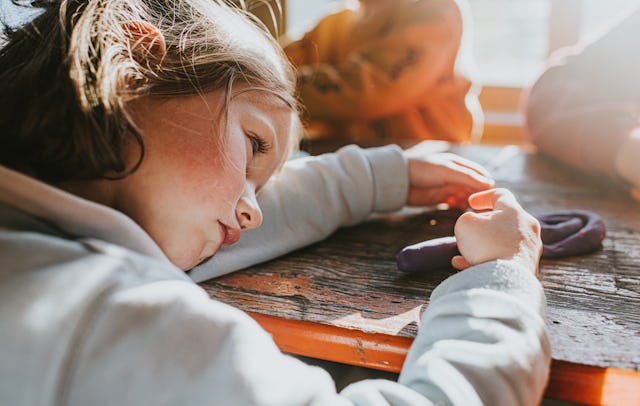What's An Orchid Child, & Are You Raising One?
Your super-sensitive kiddo isn't alone in their big feelings.

Over the years and across generations, many names have been used to describe overarching character traits in children. You might have heard of "indigo children," or perhaps you were once described as "spirited" or "creative." And lately, you may be hearing the term "orchid child" tossed around a lot in parenting convos.
While there's plenty of reason to shrink back from labels, sometimes they're helpful, too. Identifying common traits in your child and other children can help you find better resources for raising them to suit their personality and individual needs.
The same can be said for raising "orchid kids," who are a lot like the blooms from which they get their label. Orchids are gorgeous — they're one of the most sought-after flowers in the world. However, caring for them can be a little more challenging. They need just the right conditions to thrive. More than most other flowers, they're susceptible to the shifts in the world around them. Orchid flowers need special care and specific environments; orchid kids are no different.
Here's what you should know if you suspect you may have a little orchid at home.
So, what's an orchid child?
If your kid tends to experience and feel everything very deeply, you may be raising an orchid child.
"Do you have a child who experiences very big emotions? Who can go from being very calm to very excited or to almost a meltdown in what feels like instantly?" Sidu Arroyo-Boulter (@conscious.parents), a licensed professional counselor, asks in a TikTok video. "Do you have a child who seems to be particularly sensitive to sounds, to smells, to lights? Chances are you may have a highly sensitive child. Highly sensitive kids are what we call 'orchid kids.'"
How can you tell if you have an orchid kid?
According to Arroyo-Boulter, diagnosing a high-sensitivity child looks different than diagnosing anxiety, autism, or a sensory processing disorder.
"For a toddler, you may consider what they were like as a baby. A lot of highly sensitive babies tend to be very alert. They may have been the child who nothing, no amount of tricks or things like that, helped them get to sleep at nighttime or at nap time. And so you had to be very aware of the environment and adjusting their environment and their internal state so that they could finally fall asleep. Highly sensitive babies or toddlers may be more inclined to not want anybody near them except for their primary caregivers."
Of course, as she points out, the latter type of wariness is just very common for babies and toddlers in general. So, what other "markers" can you look for in your kid? According to Psychology Today, highly sensitive kids will:
- Exhibit "extreme" emotions
- React bigger to sensory input
- Notice subtle changes — in clothes, rooms, and even moods
- Be more prone to meltdown
- Experience greater desire for control of themselves and their surroundings
- Act more cautious
- Have a lower tolerance for frustration
- Have a lower tolerance for correction
- Disklike losing and, accordingly, seek perfection
- Get hurt feelings more easily
How can you better parent orchid kids?
A label is only as good as the help it offers, right? Once you've figured out that you have an "orchid kid," you need to know how best to be their parent. This isn't always easy. What worked for another kid in your family may not work for this one. Arroyo-Boulter explains why that's the case.
"They're delicate. They're beautiful. And they need a different approach," Arroyo-Boulter says. "We're often told, 'validate your child. Validate their needs. Say [and] reflect what it is they're feeling.' So, you may be telling your child, 'I know you feel angry right now. I see how upset you are,' and that may escalate your child because highly sensitive kids are so close to their vulnerable emotions and shame that when you reflect it for them, it can spike the intensity of what they're feeling."
Instead of identifying the exact emotion you believe your child is feeling, she suggests it's better just to recognize the situation is tough but will pass.
"Instead of saying, 'I see you're so upset,' stay with your child, be present with them without necessarily reflecting on what they're feeling," she suggests. "Instead, you may say something like, 'This feels really big. It's going to be over soon. I'm here for you.'"
The biggest way to help your child out? Making sure you're attuned to what they're feeling. Knowing what they need will make them feel safe and known. Says Arroyo-Boulter, "The thing that helps highly sensitive children, regardless of age, is always going to be the relationship they have with you and whether your highly sensitive child feels emotionally safe with you and at home with you."